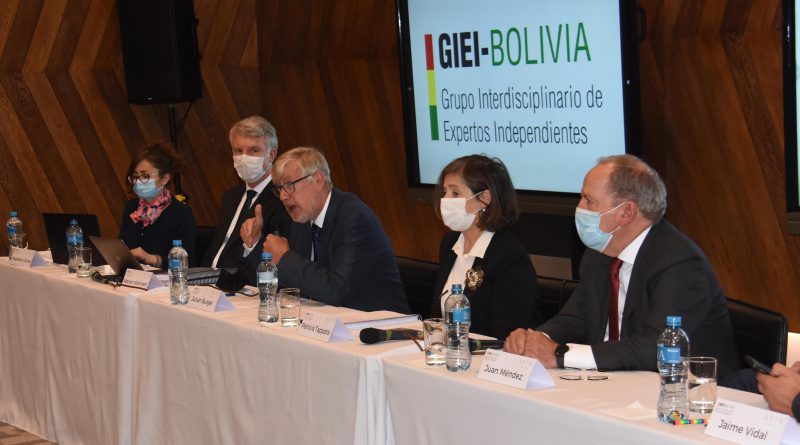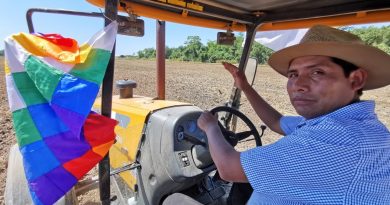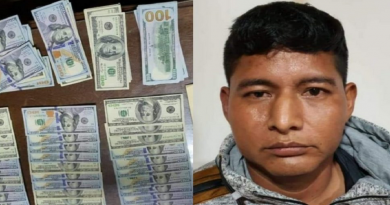OAS-Affiliated Expert Group: Bolivia Has Conditions For Fair Trials
The findings of a binding expert report on the human rights violations during Bolivia’s 2019 coup have given a new sense of hope to victims.
The long-awaited report examined the period from September 1 to December 31, 2019, during which indigenous President Evo Morales was driven from power by an alliance of economic elites, the paramilitary forces they created, military and police commanders, and anti-indigenous middle-class sectors.
Experts documented with precision how the coup government aimed to kill protesters, then insisted that security forces had not fired a single bullet. Most of the people injured in those two massacres, other smaller massacres, and individual attacks were Indigenous. The technical analysis of the injuries and deaths fills the 400-plus pages of the GIEI report. Perhaps the most frequent quote of GIEI this week has been, “We call things by their true names. What took place in Sacaba and Senkata were massacres.”
This task was entrusted to an independent group of experts in technical matters following the visit of the IACHR to Bolivia in late 2019, the organ of the OAS whose mission is to promote and protect human rights. The Interdisciplinary Group of Independent Experts, or GIEI by its initials, were given complete autonomy and secrecy until mid-August, when its report was shared across the nation. The Bolivia-GIEI Report makes three dozen recommendations, most centrally, a call for rooting out racism, and priority to resolving sexual and gender violence.
GIEI findings uphold the knowledge of the poor
After the traditional elites forced Evo Morales to protect his life by fleeing on November 10, first to his home in the coca-growing regions of Chapare, and then into exile, thousands of demonstrators took the streets and highways of the country, “largely in a peaceful manner,” in the words of the GIEI report.
At least 37 people were killed and hundreds wounded. The victims were overwhelmingly Indigenous. Anyone could see that police and soldiers used excessive and disproportionate force, but the Right denied it. What are deemed as non-lethal armaments, such as rubber bullets and tear gas, were used improperly, with the intention to injure and kill, the GIEI report found.
Paramilitary forces accompanied the urban middle class protests, who named themselves “civic committees.” It was these shock forces which carried out lynch-mob actions and torched public buildings and homes of MAS leaders. Women were especially targeted for attack by the forces of the Right or “civic committees,” as well as by the state’s security forces. Countless people were injured and raped, 92 individuals gave their testimonies of suffering torture, and at least 1,400 were imprisoned – for exercising their constitutionally-protected right to protest, or simply for being in the wrong place at the wrong time. Those who employed physical aggression against MAS marchers –or more broadly, against individuals with Indigenous features or clothing– prepared clubs with nails, home-made explosives, and the array of arms typically used by criminal bands, from whose members many of them were recruited.
During their visit, GIEI experts honored victims at sites where the atrocities had occurred. Survivors of the attacks and the families of the dead were invited to critique the expert report. In El Alto a woman said, “We are Indigenous. They insulted us, they called us drunks. We are people from the provinces,” that is, people who work the land. One man said, “I was among the first victims, on the 11th of November in Caranavi. We were detained, persecuted, and tortured. Teeth were knocked out. Ears sliced. To belong to MAS was a crime.”
A woman asked, “Yes there is political persecution, but what kind of political persecution?” She insisted it was carried out by the coup authorities, “against the poor. In my case, I was targeted only because I went to the aid of the wounded in Senkata.”
President Arce pledges compliance
President Arce addressed the victims at the opening presentation of GIEI experts: “We ask your forgiveness and we promise to accompany your families. Very special greetings to the victims, who are defending Bolivia’s democracy. In Senkata there were summary executions. Military and police forces killed people even as they were in flight.” The MAS government ratified its commitment to implement all the report’s recommendations.
Arce echoed the report’s challenge to judge the violent crimes of the Unión Juvenil Crucenista paramilitary group in the city of Santa Cruz, and the similar Resistencia Juvencil Cochala of the city of Cochabamba, “a parapolice shock group whose practices are especially racist,” according to the group of experts. Before the coup, they brutalized Patricia Arce, the MAS mayor of the town of Vinto, dousing her with red paint, forcing her to walk on her knees and humiliating her for three hours. Arce reminded the audience of victims and parliamentarians in the auditorium of the Central Bank. “They beat her with a stick implanted with nails. They threatened to take her life,” he quoted from the report.
In the city of La Paz, Patricia Hermosa, the legal representative of Evo Morales, was taken prisoner “and while incarcerated, she lost the life she was carrying in her womb.” The GIEI report details how she bled for ten days, never receiving medical attention.
Justice and political persecution cannot be confused
Upon coming to power, the coup administration passed a Supreme Decree that removed any responsibility for the consequences of armed force exercised by the police and military against protesters. It has been called “a license to kill.” GIEI’s expert investigators insist that the decree “exacerbated the climate of confrontation.”
Despite this, the Right claims that leaders from the coup era who are under investigation are political prisoners. However, the experts underscored the following: “One cannot confuse the pursuit of justice with political persecution.” Of course, right-wing parties have been doing exactly that since the presidential vote of October, 2020 that removed the de facto government.
Meanwhile, the right-wing is trying to halt to all trials of coup authorities, until Bolivia’s courts are completely overhauled. Yet the group of experts of the Inter-American system insists, “Bolivia has the conditions right now to carry out fair trials. There is every hope that justice will be won.”
By Cindy Forster of Chiapas Support Committee who reported on the release of the Bolivia-GIEI findings in La Paz and El Alto.



